The Importance of Sperm Donation in Modern Family Building
Sperm donation plays a vital role in modern family building by enabling individuals and couples to realize their dreams of becoming parents. This option provides a path for those facing infertility issues, single women, and same-sex couples to have biological children. The process of sperm donation is conducted in a regulated and ethical manner, ensuring that all parties involved are aware of their rights and responsibilities. As societal norms evolve, the acceptance and recognition of diverse family structures continue to grow, making sperm donation an increasingly popular choice for building families.
Understanding the Sperm Donation Process
The process of sperm donation involves several key steps to ensure safety and effectiveness. Initially, potential donors undergo rigorous screening procedures, including medical and psychological evaluations. These assessments help in determining the donor’s health and suitability for donation. Once approved, donors provide sperm samples, which are then analyzed for quality and viability. The samples are frozen and stored until they are matched with recipients. Throughout this process, confidentiality and anonymity are maintained, protecting both the donor and the recipient. The meticulous nature of the process ensures that the sperm used is of exceptional quality and meets all necessary standards.
Choosing the Right Donor for Your Family
For those considering sperm donation, selecting the right donor is a crucial decision. Many factors contribute to this choice, including the donor’s medical history, physical characteristics, and personal attributes. Recipients often have access to donor profiles, which provide detailed information to aid in their decision-making. Additionally, some may prioritize certain genetic traits or shared interests. It’s important to engage with reputable sperm banks or fertility clinics that offer a wide range of options and support services. This ensures that recipients feel confident and informed throughout the process, leading to a satisfying and low-stress experience.
Legal and Ethical Considerations
Navigating the legal and ethical aspects of sperm donation is an essential part of the process. Potential donors and recipients must understand their rights and obligations to make informed decisions. Legal frameworks differ by region, addressing issues such as parental rights, donor anonymity, and future contact with offspring. Many jurisdictions have established laws to protect the privacy and rights of all parties involved, minimizing potential conflicts. Ethical considerations also play a significant role, ensuring that the process is conducted with respect and integrity. It’s essential for those involved to consult legal experts and counselors to navigate these complexities effectively.
The Future of Sperm Donation
The future of sperm donation looks promising as advances in reproductive medicine continue to evolve. Technological innovations are improving the success rates of artificial insemination and in vitro fertilization, making family building more accessible than ever. As societal attitudes shift towards greater inclusivity, it’s expected that sperm donation will become an increasingly normalized and celebrated option for family creation. Continuous research and dialogue in this field will further enhance the understanding and acceptance of sperm donation, empowering more individuals and couples to pursue their family goals. The ongoing commitment to ethical practices and support for donor-conceived families is crucial in shaping a positive future for sperm donation.
Conclusion
In conclusion, sperm donation offers a valuable pathway for many individuals and couples seeking to build families. By understanding the process, legal considerations, and ethical implications, those involved can make informed decisions that align with their values and aspirations. As society progresses towards greater acceptance of diverse family structures, sperm donation will continue to play a crucial role in helping people achieve their dreams of parenthood. The combination of technological advancements and ethical practices promises a bright future for all those who choose this reproductive option.
